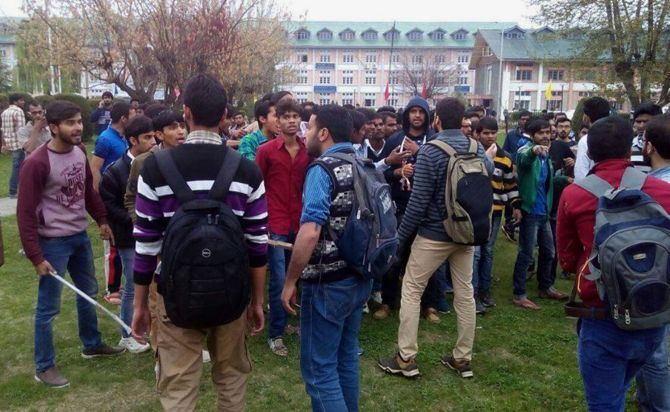Mehbooba Mufti is running an alliance that is unnatural -- and one she instinctively militates against.
She needs to be responsible in what she says and does -- and her time starts now, says Aditi Phadnis.

Mehbooba Mufti has become chief minister of Jammu and Kashmir and even before she can be elected to the legislative assembly (as she is a member of the Lok Sabha, she will have to resign and contest the assembly, possibly from her father's seat, R S Pura), she is facing a challenge to her authority.
Those not from the state are asking Kashmiris, 'Who do you stand for: The West Indies or India?' The issue was, of course, the T20 cricket match last week, which India lost to the West Indies. Crackers were burst in Delhi also, because the better team won the game.
But in Jammu and Kashmir, the only state in India where you get the right kind of willow wood to make cricket bats, things are not so simple, especially when it comes to cricket.
So students at the National Institute of Technology, who celebrated India's defeat in the match, clashed with those who had wanted India to win. But, of course, there was a subtext.
According to local newspapers, Kashmiri students held a solidarity march on the university campus, chanting pro-freedom slogans. One of the placards held by the protesting students read, 'No IIT, no IIM; only freedom.'
The security forces swung into action, there was tear gas and a lathi-charge and the institute was shut immediately.
Outraged, the Kashmir University Students Union termed the incident a 'crafted episode' and alleged that it was a glaring example of how even campuses and institutes in the Kashmir valley 'are being colonised and made hostile for Kashmiri students by the Indian State.'
'It should serve as an eye-opener for all (that) while the whole valley fears for the safety of their loved ones studying or working in India, Kashmiris are not safe even in their homeland,' a statement said.
'The hegemonic atmosphere created by the outsiders with the full support of Indian forces and the establishment is an extension of the State policy of strengthening the occupation and control on Kashmiris.'
This time, it was not the National Conference that was in the saddle -- it was Mehbooba Mufti, who has long argued that separatism is just a word. She has always talked of taking everyone along in the state, including those who question the Constitution of India.
If she managed to take the Peoples Democratic Party to victory in the last elections, it is because she enjoys a degree of support among groups that don't accept Kashmir's integration with India.
Indians outside the state would be fooling themselves if they believed the state is fully integrated into India: It is not.
The PDP exists and continues to be relevant because it reaches out to the separatist discourse, offering itself as a bridge between India and the separatists. It needs the separatists -- and the separatists need it.
It is this constituency that Mufti knows she needs to reassure. The extended negotiation with alliance partner, the Bharatiya Janata Party; the marked and public reluctance to form a government with the party; the one-step-forward-two steps-back dance... it was all carefully choreographed to send the signal that doing a deal with the BJP didn't mean selling out the interests of the state; on the contrary, it meant strengthening them.
But nothing in the state is ever what it appears to be. And it takes minutes, not hours for a spark to become a conflagration. The situation at NIT seems to be under control for the time being. But it will continue to be a reminder of what New Delhi is dealing with.
How do you govern an entity so volatile?
Actually, what Narendra Modi said during a campaign rally at Tinsukia in Assam might work best: 'Development, development, development.'
There is a crying need for coordinated development of the state -- not via large industries or big dams but through small interventions like building roads so that the famed Jammu rice and lentils can come down to other states in the plains and aggressive marketing of Kashmiri Pashmina, carpets and the exquisite embroidery on Kani shawls...
It is not clear how the new chief minister and the BJP will reconcile their interpretations of Kashmiriyat. To be sure, there will be differences. The 'Agenda for Alliance' forged between the two parties as a common minimum programme will tell both what not to say or do. But obviously spontaneous incidents like the one at NIT will have to be managed.
For Mufti, being practical while running an alliance that is unnatural -- and one she instinctively militates against -- is the challenge. She needs to be responsible in what she says and does -- and her time starts now.











 © 2025
© 2025